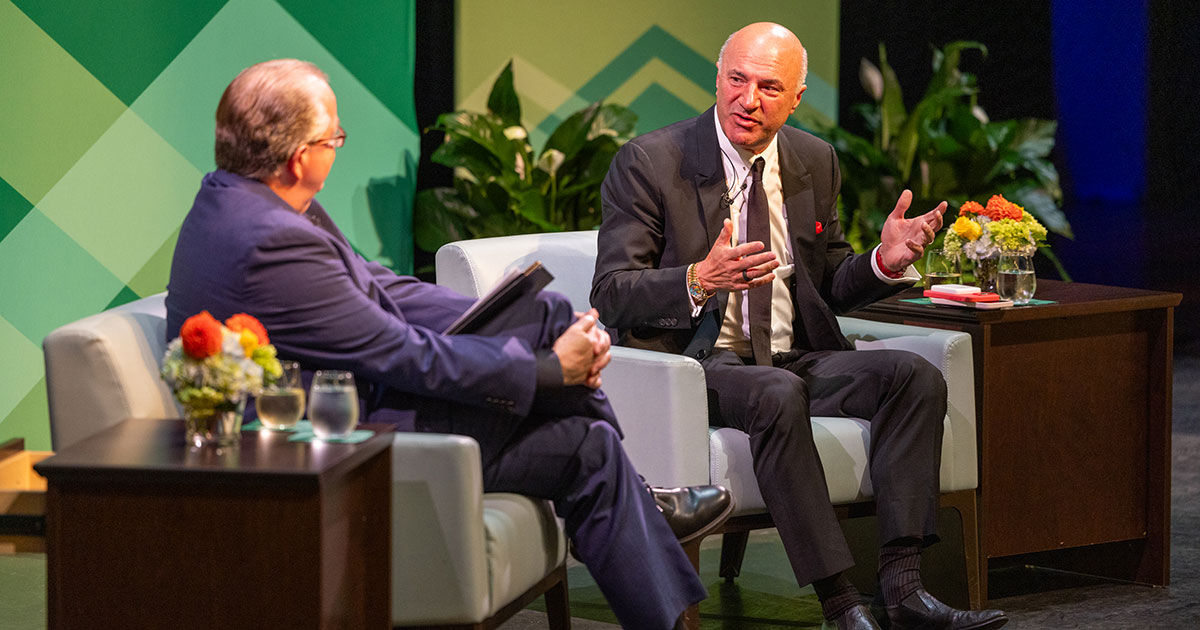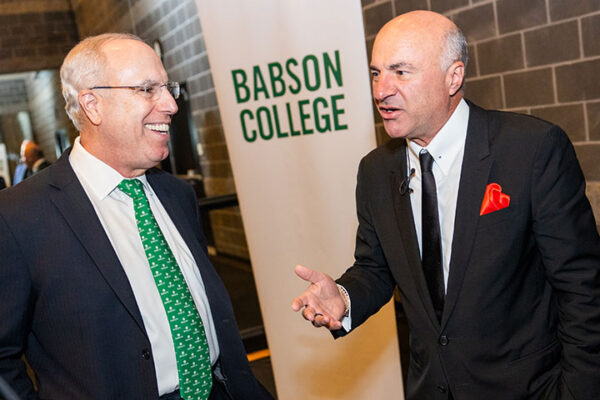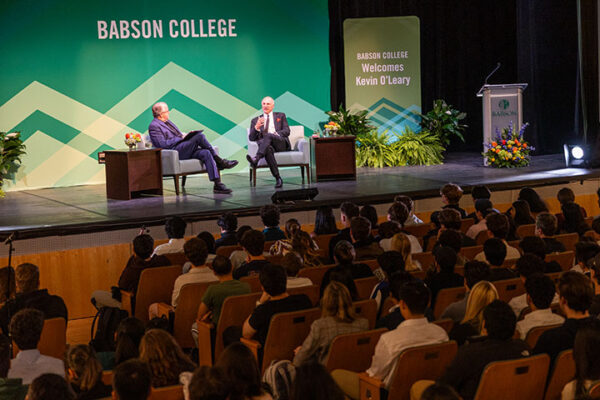A Shark Comes to Babson: Eight Lessons from Kevin O’Leary

There was a Shark sighting at Babson College last week.
An investor, entrepreneur, and a longtime Shark on the popular ABC show “Shark Tank,” Kevin O’Leary spoke to a packed and engaged audience at the Sorenson Center for the Arts.
In a conversation with Jack McCarthy MBA’82, associate professor of practice in management at Babson, O’Leary looked back on his career, on his triumphs and setbacks, and on the lessons he has learned through his years in business. “The pursuit of entrepreneurship is not a destination,” said O’Leary, known by the nickname “Mr. Wonderful.” “It is, in fact, a journey.”
Here are eight takeaways from O’Leary’s visit to Babson.
1. Accept Failure
The event was entitled Embracing Failure as a Path to Entrepreneurial Success, and O’Leary spoke about how failure is inevitable. The crucial thing is to learn from it.
“I personally would rather invest in an entrepreneur who’s failed three or four times,” he said. “I’m not encouraging you to fail, but I’m saying it’s going to happen anyway. Get over it before it happens. It’s not the end of the world. You just get up and keep going.”

2. Tell the Truth
O’Leary is known for being candid and direct on “Shark Tank,” but he says he’s not purposely trying to be mean. “I get to be known as the mean Shark for telling the truth,” he says. “I just tell the truth and sometimes people don’t want it.”
O’Leary doesn’t want to be disingenuous and offer enthusiasm for a venture if he doubts it’s going to work. “I tell it the way I see it,” he said. “Entrepreneurship is tough.”
3. Look in the Eyes
When entrepreneurs enter the set on “Shark Tank,” they must stand for a couple of minutes while the crew shoots needed video. In that moment, the entrepreneurs stand right in front of O’Leary, and he sizes them up. “I just look at them,” he said. “I don’t smile. I don’t play. I just look at them. Not everybody can handle that.”
Even though the entrepreneurs haven’t said a word yet, O’Leary makes a judgment on whether they are a winner or a loser. “If you can’t stare someone back, what does that say? You’re not ready,” he said. “When you have a plan and you’ve done your homework, you’re ready. And, it shows in your eyes.”
4. Three Criteria for Success
O’Leary said successful entrepreneurs meet three criteria. First, they can articulate their vision in 90 seconds or less. Second, they can explain why they’re the right person to execute their vision. “Great ideas are a dime a dozen. Execution skills are really hard to get,” he said. “Investors know that execution skills are everything.”
Lastly, entrepreneurs know the numbers. How big is the market? What’s the break-even analysis? How many competitors are there? “You got to know that stuff,” he said.
Meeting all three of these criteria is the definition of leadership, O’Leary said. “You have to have them all. Not some of the time. One hundred percent of the time.”
“I’m not encouraging you to fail, but I’m saying it’s going to happen anyway. Get over it before it happens. It’s not the end of the world. You just get up and keep going.”Kevin O'Leary
5. Learn to Listen
O’Leary spoke of the importance of listening, both to others and to your own gut instinct. He told the story of loaning a friend $250,000 to start a business, a sum that the friend soon burned through.
When the friend asked for another $250,000, O’Leary’s gut told him to be skeptical, but after talking with others, O’Leary ignored his gut and gave the man the money, which he promptly burned through again. “This guy didn’t know what he was doing,” O’Leary said. “I knew I shouldn’t have made that investment.”
O’Leary emphasized, however, that hearing the opinions of others is essential. He tries to live by the metric of listening for two-thirds of the day and talking for only a third.
“Shut up and listen. Because you’ll hear the train coming down the track a long time before anybody else,” he said. “I’m listening and listening, and I form opinions based on information. And, then I make good decisions.”
6. Don’t Make Decisions Under Duress
To be effective, leaders need to have a clear mind. If they’re having a difficult day and facing personal issues, they can’t allow that to interfere with their work. “Don’t do anything of consequence that day,” he said. “You got to figure out, either take the day off, or don’t make decisions.”
Amazon’s Jeff Bezos once told O’Leary that he only made important decisions in the morning. Nothing consequential was decided after noon. “Because he got tired, and he made bad decisions,” O’Leary said. “I thought that was great advice.”

7. Be Authentic
Social media is a powerful tool for acquiring customers. “The most successful entrepreneurs that I’ve met of late have figured out social media,” O’Leary says. “They figured out the ability to acquire a customer for practically nothing by being a great storyteller.”
The trick is that social media requires authenticity. O’Leary spoke of the mother-daughter entrepreneurs behind “Shark Tank” business Wicked Good Cupcakes. The pair were always having disagreements, which they shared on social media.
“They were spilling out their guts on social and people really loved that,” O’Leary said. “I was watching sales and thought, my goodness, keep fighting. This is fantastic. And, these guys grew this whole multimillion-dollar business.”
8. Entrepreneurship Is About Freedom
O’Leary said that entrepreneurs shouldn’t create and build ventures for money. Rather, their goal should be the pursuit of freedom and the ability to control their own destiny. “You got to get to the place where you could turn your phone off. It doesn’t matter who calls you, because you don’t have to take the call,” he said. “That’s it. That’s what you want.”
He added, “For me, entrepreneurship and the freedom it gives is the essence of life.”
Posted in Entrepreneurial Leadership, Insights




